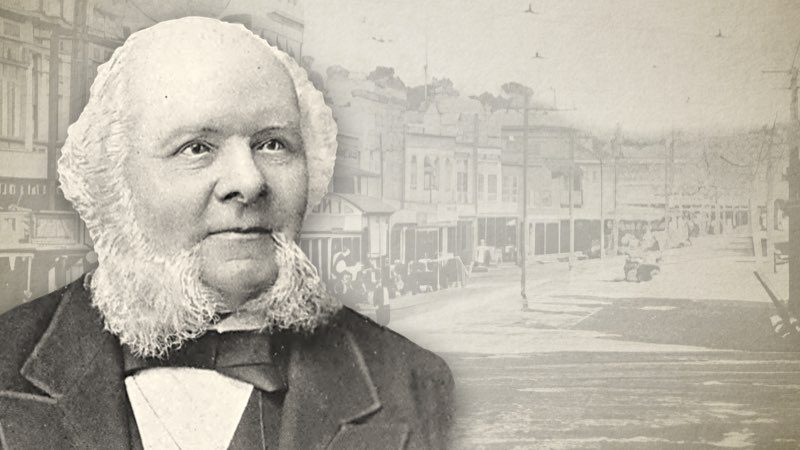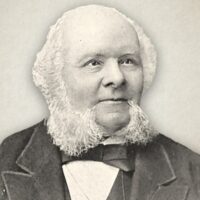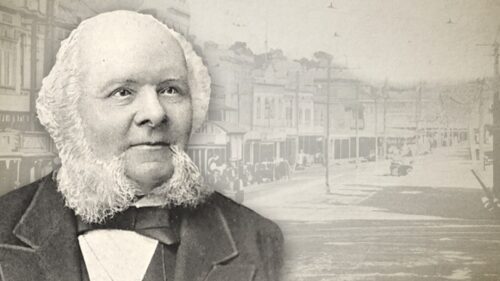
The Floating Axe Head
“And the iron did swim.”—2 Kings 6:6
The prophet Elisha and his disciple were dwelling in Gilgal, when it became evident to the sons of the prophet that owing to their increasing numbers they must move to a more convenient spot. A proposition was therefore made, that they should go unto Jordan; and the prophet’s consent having been granted, they push on to this part. Upon arriving they find it well studded with trees, that it becomes necessary to level a number of them, that they may extend the space for their habitations, as well as employ the timber for their construction. And as one was felling a beam his axe head fell into the water, when he cried and said, Alas, master, for it was borrowed. But Elisha, nothing daunted by this apparent mishap, asked where it fell; and having been led to the spot, he cut down a stick, and cast it in thither, and the iron did swim: the axe head therefore was recovered, and the employment resumed. And is this all, beloved? Is there nothing else to be gathered from this extraordinary incident? We suppose the venerable Dr. Gill thought not, for he only recapitulates the literal circumstances of the case, and leaves us entirely without the hidden meaning. What other writers say upon the matter we know not, and so are driven again to that blessed Commentator, who has so graciously promised “to lead us into ALL truth.” He has seemed to press home upon us the following reasons why this striking incident is left upon record.
1st. To show us that that which is impossible with man, is possible with God. “The iron did swim.”
2nd. That that which seems to us to be the right implement to bring about desirable ends, is dashed from our hands to try our faith. “As one was felling a beam, his axe head fell into the water.”
3rd. That though buried deep in the mud, and completely covered by difficulties, if it be the right instrument, at the Lord’s command it must come to the surface, “Elisha cut down a stick, and cast it in thither, and the iron did swim.”
4th. That the result of such wonder-working must bring glory to God, and strength and encouragement to the exercised soul.
1st. Then, beloved, this striking narrative is left upon record, we believe, to show us that that which is impossible with man, is possible with God—“The iron did swim.” Have you not, beloved, seen this verified in your business transactions, for instance? Again and again, ye that are looking above in these matters, how inextricable seemed that difficulty. You thought you would never surmount it; it really was beyond an ordinary trial. Your name must surely come out before the world in disgrace; and yet, no, the Lord has worked a deliverance in a most miraculous and unthought-of way, and you are brought of a truth to see how the iron did swim. Again, in your domestic affairs, how crowded the anxieties became. Perhaps some dear child laid upon a bed of illness, and others sickening. It may be also that the partner of your bosom is a sufferer from disturbed nights and a racking mind; and you have left your home under these accumulated anxieties with a heavy heart, saying, “Surely, all these things are against me.” But, no, the cloud has passed away, things have assumed their wonted appearance, and again you have seen in your experience how the iron did swim. Again, there’s that ministry of the gospel; how wonderful the chain of providences that have placed him in that position. It may be a few years ago he never dreamed of such a standing; and when the Lord began to remove the veil from his eyes, and direct his thoughts to his future work, he said within himself, Impossible! This can never be; and yet it is effected miraculously—intricutely—but successfully; and a review of the whole course brings him to the acknowledgement. Truly, “the iron did swim.” And then with regard to the salvation of the immortal soul. What a marvel of the immortal soul. What a marvel to ourselves we are; a few short years ago dead in trespasses and sins. Suddenly, it may be, awakened to a sense of our condition, led to Calvary to behold the dear bleeding sacrifice; to feel the efficacy of his precious blood; to have a sense of pardon and forgiveness, and to gain blessed liberty of soul. How marvelous the way in which this was all effected. What a mighty change has been brought about. What was impossible with man, was possible with God; and you are brought blessedly to see how of a truth “the iron did swim.”
2nd. That which seems to us to be the right implement to bring about desirable ends, is dashed from our hands to try our faith. If the implements are of our own making, the sooner they are dashed out of our hands the better; but the Lord sometimes removes for a time instruments that He has Himself given, that the spirit of resignation and faith may be put in exercise. He has promised that “the rough places shall be made smooth;” but not that it shall be done in a moment as a rule. The trees most certainly shall be felled, but the process shall be slow; that He may be constantly sought for, and faith strengthen in Him as the God of the proceedings. If we could be brought to believe that the Lord removes all difficulties rapidly, we should be tempted to build a tent at the foot of the tree, fold our arms in creature security, and say, all is well; and the tree might then fall across our tent in the darkness of the night, and we be crushed under its weight. But He says, “I will be inquired of by the house of Israel, to do these things for them.” They shall well use the means of grace that I have placed as their disposal, and I will bless them in those means. They shall be brought constantly upon their knees at my throne, that they may fell the efficacy of heartfelt outpourings of the Spirit. They shall be melted before me to behold their nothingness, and to learn that the entire work for their eternal good is from above. I will dash their implements from their hand, but I will in love and tender mercy show them—
“Behind a frowning providence,
I hide a smiling face.”
3rd. Though buried deep in the mud, and completely covered by difficulties, if it is the right instruments, at the Lord’ command it must come to the surface. However dark and inexplicable circumstances may appear to us, all is clear to God. We have but finite and momentary comprehension—He as infinite. If we see a thing is lost, as was the axe at the bottom of the water, we say it is impossible that it will ever be again used. Not so, Jehovah; if he means it again to be used, it shall float to the surface, and be at hand. A Saul, how buried in the mud, he surely can never be brought out. He was the worst of characters, making havoc of the church, entering into every house, and haling men and women, committed them to prison. But when a voice from heaven came, saying, “Saul, Saul, why persecutes thou me?” Saul is stricken to the earth, but comes out of the filth and mud of unregeneracy, the brightest of God’s shining lights. Truly the iron did swim. And again, a Manasseh, who made the inhabitants of Jerusalem to err, and do worse than the heathen, was made to humble himself greatly before the God of his father, and to cry unto the Lord his God for mercy. He comes out of the miry clay to be foremost in breaking down false idols, and worshipping the true and living God. Truly, “the iron did swim.” Nor need we multiply instances, beloved, our own liberation from the depths of depravity and sin, seemed as unlikely at one time, as that the axe which lay buried at the bottom of the waters, should swim to the surface: and yet the hand of God has accomplished it, and when his command came, no power of earth or in hell could retain us. Truly the iron did swim; the miry clay was obliged to yield, however deeply embedded the iron heart became therein. And herein, beloved, is the greatest encouragement to continue our earnest appeals at the throne of grace, on behalf of the conversion of those dear to us in the flesh, who are still dead to the things of God and eternity. Oh how impossible (humanly speaking) it seems to us, that such a one dear to us shall ever be brought to the knowledge of the truth. There is not a spark of grace, no sign whatever of a divine change; yea, a complete enmity is maintained strongly and bitterly, against anything that pertains to God: the world courted, its society enjoyed. And yet, plead on, my brother; pray on, my sister: who knows but what adverse as all existing circumstances may appear, that yet in a marvelous way, as with a Saul, and a Manasseh, that yet the iron shall swim? And you, poor sin oppressed soul, never despair. Deep buried in the miry clay you may be, yet put up that upward cry for deliverance from on high. Yea, cease not day nor night, to cry unto Him; for that which seems impossible to thee, is yet possible with thy God. The strong city walls must fall before the sound of the rams’ horns, when He wills it. The running waves of the might ocean must divide when He commands it. The iron, deep buried as it may be by its own weight in the bed of the river Jordan, must swim to the surface when He orders it. But above all, mightier work still; a sinner dead in trespasses and in sins, must be born again in Christ Jesus at the appointed time: and the career of that sinner thus saved will be a series of miraculous providences, which will bring him again and again to acknowledge, of a truth “the iron did swim.”
4th. The result of all such wonderful working brings honor to God, and strength and encouragement to the exercised soul. He does it all for his own glory, as He told Moses in the wilderness—“In very deed for this cause have I raised thee up, for to show in thee my power, that my name may be declared throughout all the earth.” And the apostle Paul seems to respond to this language when he says, “All things are for your sakes, that the abundant grace, might through the thanksgiving of many redound to the glory of God. So we see the whole work brings honor to his great name; hence adds David joyfully, “Sing forth the honor of his name, make his praise glorious.”
Well, beloved, in conclusion, what is the spiritual moral (if we may so term it) of the matter? Just this, that nothing is too hard for the Lord, if according to his own sovereign will to accomplish. If it be our project, it is not worth a straw. If it be His, it is deep in design and purpose; and though we cannot see how it will be effected, it will most assuredly be brought about to our eternal gain and his glory. His way of working way appear to our finite comprehension, ofttimes a slow way; but depend upon it, it is a sure way. And cannot you and I, beloved, upon a review of the way the Lord hath led us, point to incident after incident where the iron, as it were, did swim in our experience? The most unlikely ends were obtained by the most unlikely means, and we were left miracles of God’s grace. How differently if we could have worked it, and how abortive that work would have been; not so with our God—all is well ordered with Him. His plans are divinely matured, and carried out with a covenant infinitude. Oh, then, let our confidence be in such a God; and while, beloved, you and I are pressing onwards through this thorny wilderness, torn and shorn as we may be, yet may we look above and think of Him, who causeth the iron to swim, and works all for our eternal good. Doubtless we have in heartfelt experience oft-times, to address our God in the language of the Psalmist, “Lord, how are they increased that trouble me; many there be that rise up against me, many there be which say of my soul, there is no help for him in God. But thou, O Lord, art a shield for me; my glory, and the lifter up of my head.”
Look out then, beloved, for the Lord’s hand; and untoward as existing circumstances may be, if He purposes working out a deliverance, the very iron will swim at his divine command. And may this simple view of this matter tend to cheer your heart, and lead you still to the watch-tower; and when in an unguarded moment you are apt to think He has forgotten you, and left you to yourself, oh, think that deep buried as the instrument may appear to you to be, it will yet rise at the Lord’s own right time: yea, it will swim to the surface for your faith to grasp, and so will He keep you vigilant to the end, watching for, and trusting in, a God of wonders.
Yours in this belief,
George Cowell
Oliver Terrace West,
Bow Road, London
April 1, 1858
George Cowell (1822-1884) was an Independent sovereign grace preacher and author. He also served a short time as editor of the Gospel Magazine.




